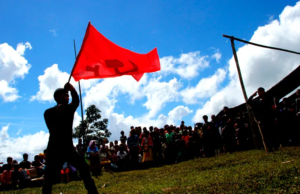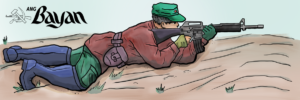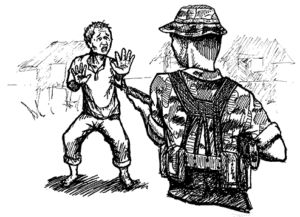Revolutionary people’s struggle against pests

Tay Amag holds dear the principle of collective action because this was key in improving lives in their community. He is a leader of a Lumad-Mamanwa organization at a guerrilla front in Northeastern Mindanao, and has been supporting the revolutionary movement for five decades now.
People in Tay Amag’s community have been instilled with the mutual principles of cooperation and collective production. “Comrades guided us in forming our organization to unite the Mamanwa tribe and the Visayan settlers. Through hunglos (bayanihan or communal unity), farmlands expanded and became more productive. We were able to earn more. We are able to supply food for our families, and also we have surplus which we sell in town,” recalled the elder.
Thus, despite relentless military harassment, he never surrendered. Instead, he continues to monitor the movements of the soldiers who pester their community, and continues to assist the people’s army.
Even when Tay Amag was exposed to the enemy, he stood firm and faced the soldiers’ accusations. One time, he knew soldiers were set to order him do something against his will. He evaded the soldiers who surrounded his house, and since then moved to the forest with his family. To survive, he continued to open secret farmlands.
“I and my family never abandoned the revolution,” said Tay Amag.
He and his village mates have been steeled in waging revolution. They have devised ways to secure comrades and neighbors who are active in the movement. “We are always cautious especially now that some of our villagefolk are in the enemy’s hands. We try to avoid becoming like them.”
That the military is anti-peasant is clear to him. “All our hard work are destroyed and gone since the soldiers arrived.” Their farm work has been impeded on the military’s absurd claims that “farmlands are large to provide for the people’s army.” This is why people are back to being poor, explained Tay Amag.
Tay Amag called on his fellow farmers to remain firm and persevere in the face of the enemy’s attacks. To comrades in the people’s army, “remain strong, master balancing your tasks,” he said. “Trust that I will always be with you,” pledged Tay Amag. “What ever you need, I will never hesitate to offer my service as your amag sa kahabjun (light in the darkness).”
Pests in the village
Gudo and his father Tay Domeng were seeking a solution to pests also plaguing their village in a Southern Mindanao guerrilla front. In early 2020, rats infested their cornfields resulting in gnawing poverty and hunger in the community. Their expected harvest of 25 sacks of corn became two sacks.
Villagefolk used to act on these economic problems with dispatch. In fact, a kalmas (kalihukang masa or mass movement) was already planned to hold the ruling government accountable. They demanded crop insurance and calamity funds, and also sought to take back their lands which the Duterte regime gave to mining and plantation companies, and for the expansion of military camps.
But with the current infestation, residents are constrained from acting due to military presence in their village. Residents from adjacent barrios are also apprehensive about participating. “Fear spread further in the community after soldiers killed two of our leaders,” said Tay Domeng.
Tay Domeng and Gudo understand that the villagefolk are terrorized by the killings and the continuing and long-term military occupation of their community. But according to Tay Domeng, they should worry more about gradually dying of of hunger, or being buried in debt because of poor harvest due to pests.
“The organization must grasp the error of separating kalmas for corn production and kalmas against militarization,” they noted. Among the solutions to the rat problem they have devised is to be able to get past through checkpoints in order to facilitate meetings once again.





